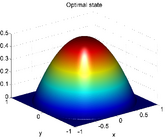Optimal control with L^1 constraints
Florian Kruse and Karl Kunisch
During the last decade, PDE-constrained optimal control problems with sparsity promoting objectives such as the $L^1$ norm have received a great deal of attention. They model, for instance, the optimal placement of actuators and sensors as well as the energy-minimal steering of a system towards a desired state. This can, e.g., be used to design earthquake-resistant buildings or to control chemical reactions. Using this problem class it is, furthermore, possible to obtain controls that have a significantly simpler structure than controls for differentiable objective functions. In a practical application this could translate to an automated vehicle that takes passengers from A to B in a time-efficient manner while maintaining constant speed during long periods of the trip (as opposed to frequent de- and acceleration).
In contrast to sparsity promoting objectives, sparsity promoting constraints have received little attention so far. This project focuses on the investigation of optimal control problems with an $L^1$ norm constraint. Since semismooth Newton methods have been applied very successfully to optimal control problems with sparsity promoting objectives, we aim, in particular, at extending these methods to optimal control problems with sparsity promoting constraints. This will result in highly efficient algorithms to solve such problems.

